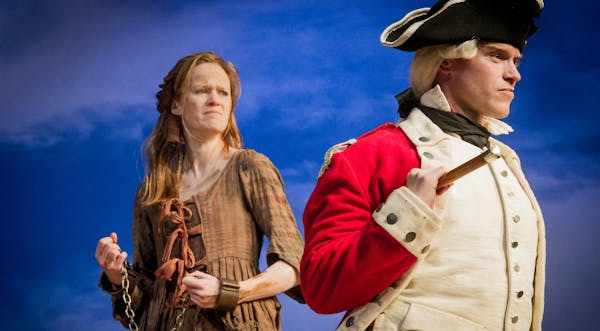"Theater is an expression of civilization," says the enlightened governor of wild and fearful New South Wales. "These men will create a new society here."
These men, and women, are convicts whose humanity has been stripped away in the Australian penal system of 1788. A world away from their native England, they are given a chance to recapture a measure of optimism and compassion — a chance to feel human again — by putting on a play.
"Our Country's Good," by Timberlake Wertenbaker, tells this intriguing true story about the power of theater. Director Max Stafford-Clark revived the work in a staging for Out of Joint and Octagon Theatre Bolton. The production opened Friday in a cool and erudite presentation at the Guthrie in Minneapolis.
The show travels lightly, with a set design (Tom Shortall) defined by rumpled muslin representing the sails of ships that have isolated the convicts — and their guards — and the tents inhabited by officers. Johanna Town's lighting casts shadows and dimension on a story that travels down many roads.
Tom Andrews is perhaps the most impressive of the cast, playing the aforementioned governor, who has the vision to gauge the implications of peopling a colony with hardened criminals. He has a calm and commanding demeanor, with a generosity unusual for a man who is stuck at the end of the world. Andrews also portrays a convict who poignantly clings to his aspirations of language and romance.
Nathan Ives-Moiba gives Ralph Clark, the officer who directs the purported staging, a starchy carriage and a priggish benevolence toward his actors. Jessica Tomchak and Kathryn O'Reilly are convicts who best illustrate the flowering of hope and eloquence — Tomchak's character from a timid mouse and O'Reilly's from a loudmouthed tough.
Actor Sam Graham occupies the most space, with four roles, including an officer haunted by the men he's hanged. Graham is so effective in quick transitions and mood changes that we're not sure until the final bow that he's one person.
Wertenbaker and Stafford-Clark wisely usher away from caricature the competing interests of officers who felt staging a play was a dumb idea. Cornelius Macarthy's officer makes the not-unreasonable argument that convicts would be better off learning a trade or how to farm. Richard Neale's officer is a mean realist, recognizing "the mortar of fear" that binds convicts. Hangings provide the only theater they care about, he growls.
But the beauty of Wertenbaker's play (based on the novel "The Playmaker" by Thomas Keneally) is that tough literalism — the stuff of facts and cold observation — can be stood on its head by art.
"Our Country's Good" can meander on occasion as it seeks to show many aspects of this 18th-century experience. It can bog down in the obligatory scenes of convicts hamming up during rehearsals. But by evening's end, as tough criminals become vulnerable and anxious actors, we witness the alchemy of theater.
Graydon Royce • 612-673-7299

Minnesota Sports Hall of Fame: A class-by-class list of all members

This retired journalist changed professional wrestling from Mankato

